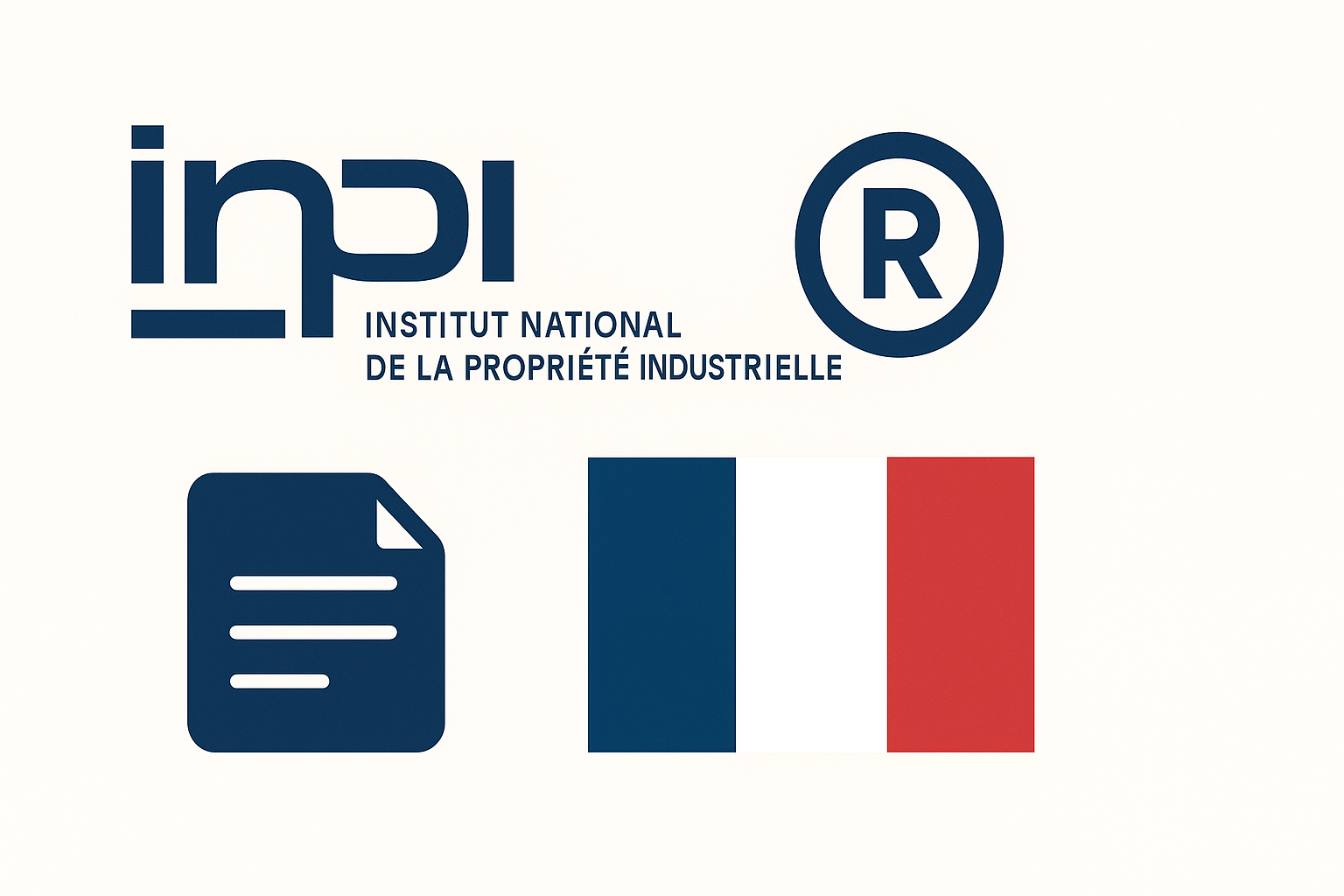French Trademark Registration: A Practical Filing Guide
This guide provides international IP practitioners with comprehensive instructions for filing trademarks in France through the Institut National de la Propriété Industrielle (INPI). The French system operates under the Intellectual Property Code and offers protection for ten years, renewable indefinitely.

Pre-Filing Requirements and Strategy
Availability Search
Conducting thorough availability searches before filing represents a critical step. INPI does not examine relative grounds for refusal during prosecution, meaning the office will not identify conflicts with earlier rights. This places the burden on applicants to identify potential conflicts before filing.
Professional searches should cover the INPI database for French trademarks, EUIPO databases for EU trademarks, and WIPO’s Global Brand Database for international registrations designating France. The search must examine identical marks and phonetically, visually, or conceptually similar marks across identical and related goods and services.
Beyond trademark databases, practitioners should search for unregistered rights including company names, trade names, domain names, and well-known marks that could form the basis for opposition.
Classification Strategy
The Nice Classification system governs the specification of goods and services. Strategic classification requires balancing comprehensive protection with cost considerations:
- First class: €190
- Additional classes: €40 each
- French Polynesia coverage: €60 (optional)
Applicants must provide precise specifications since vague descriptions trigger objections from INPI examiners. The INPI provides a database of pre-approved terms that receive faster processing.
Priority Rights
France recognizes priority rights under the Paris Convention. Applicants can claim priority from earlier applications filed in Paris Convention countries within six months for trademarks. Priority claims require submission of a certified copy of the priority document with French translation within three months of filing the French application.
Mandatory Representation Requirements
French law establishes specific representation requirements based on residence and nationality.
Representation is mandatory when:
- Applications have multiple applicants (regardless of residence)
- Applicants are not resident in France, EU member states, or European Economic Area
Representatives must be industrial property attorneys registered with INPI, attorneys-at-law (avocats), or other qualified professionals established in the EU or EEA. Powers of attorney can be simple documents signed by the applicant and do not require notarization or legalization.
Absolute Grounds for Refusal
INPI examines all applications for absolute grounds for refusal, which relate to the inherent characteristics of the mark itself. These grounds prevent registration regardless of third-party rights.
Lack of Distinctiveness
Marks must distinguish the goods or services of one undertaking from those of others. INPI refuses marks that lack inherent distinctive character, including signs that have become customary in current language or trade practices.
Descriptive terms that merely describe characteristics of goods or services cannot register unless they acquire distinctiveness through use. This includes terms describing quality, quantity, intended purpose, value, geographical origin, or time of production.
Generic terms receive absolute refusal since allowing registration would prevent competitors from using necessary descriptive language.
Other Absolute Grounds
Signs prohibited by law include:
- State emblems, official hallmarks, flags (Article 6ter Paris Convention)
- Geographical indications for wines/spirits not originating from designated areas
- Signs contrary to public policy or morality
- Deceptive marks that mislead about nature, quality, or origin
Acquired Distinctiveness Exception
Marks initially lacking distinctiveness can overcome refusal by demonstrating acquired distinctiveness through use. This requires substantial evidence of use, advertising expenditure, market surveys, and consumer recognition.
Relative Grounds and Opposition Risks
While INPI does not examine relative grounds during prosecution, third parties can invoke these grounds through opposition proceedings. Understanding relative grounds helps practitioners assess opposition risks.
Common opposition grounds include:
- Earlier registered trademarks and pending applications
- Well-known marks (Article 6bis Paris Convention)
- Company names and trade names
- Domain names actively used in commerce
- Protected designations of origin
- Copyright works and registered designs
Filing Procedure
Electronic Filing Requirement
Since 2016, INPI requires electronic filing for all trademark applications through the e-procedures portal at procedures.inpi.fr. Paper applications face automatic rejection.
The electronic system guides applicants through required fields and validates information before submission. Applicants must create accounts and can save applications as drafts.
Required Application Elements
Applications must contain:
- Complete applicant information with accurate name and address
- Clear representation of the mark
- Precise specification of goods and services with Nice Classification
- Proof of fee payment
For word marks, applicants input the text directly. Figurative marks require image uploads in specific formats. Three-dimensional marks need multiple views, and sound marks require audio file uploads.
Payment Methods
INPI accepts credit cards and INPI deposit accounts. Applications without proper fee payment receive rejection for failure to comply with formal requirements.
Examination Process
Formal Examination
INPI conducts initial formal examination to verify applications contain all required elements and proper fee payment. Formal objections address missing information, unclear mark representations, improper classifications, or insufficient fees.
Applicants receive specific deadlines to correct formal defects:
- One month for formal shortcomings
- Two months for substantive issues
Substantive Examination
Following formal acceptance, INPI examines applications for absolute grounds for refusal. This examination focuses on distinctiveness, legality, and compliance with statutory exclusions. The office does not search for conflicting earlier rights during this phase.
INPI issues reasoned objections explaining the basis for refusal and setting deadlines for response. Applicants can argue against objections, provide evidence of acquired distinctiveness, or amend applications to overcome refusals.
Publication Process
Accepted applications receive publication in the Bulletin Officiel de la Propriété Industrielle (BOPI) within six weeks of filing, though practice shows publication typically occurs within four weeks. Publication triggers the two-month opposition period.
Opposition Proceedings
Timeline and Parties
Third parties have exactly two months from BOPI publication to file oppositions. This deadline cannot be extended, and late oppositions face automatic rejection.
Eligible opponents include:
- Owners of earlier trademarks
- Well-known mark owners
- Company name holders
- Trade name owners
- Domain name registrants
- Holders of protected designations of origin
Opposition Procedure
The reformed opposition procedure introduced by the 2019 ordinance creates a more adversarial process. INPI notifies applicants of oppositions and provides opportunities to respond within specified deadlines.
Key features:
- Single opposition can be based on multiple prior rights
- €400 for opposition based on single right
- €150 for each additional prior right
- Cooling-off periods available for negotiations
For trademarks registered more than five years, applicants can request proof of use, requiring opponents to demonstrate genuine commercial use of their marks.
Registration and Strategic Considerations
Timeline
Registration timeframes:
- Uncontested applications: around 3 to 4 months from filing
- Opposed applications: 10-11 months
INPI issues electronic registration certificates through its online portal. Registered marks receive protection from the filing date, providing retroactive protection.
Term and Renewal
French trademarks register for ten years from the filing date and renew indefinitely for successive ten-year periods. The system requires no proof of use for renewal. Renewal applications must be filed within six months before expiry, with a six-month grace period available upon payment of additional fees.
Madrid Protocol Integration
French registrations can serve as basis applications for Madrid Protocol international registrations. The six-month priority period provides opportunities to file in other Paris Convention countries while claiming French priority.
Risk Assessment
The lack of relative grounds examination during prosecution means opposition risks remain until the two-month opposition period expires. Strong marks with clear searches face minimal opposition risks, while descriptive marks or those similar to existing rights face higher risks.
This risk assessment should inform filing strategies and preparation for potential opposition defense. The French trademark system provides comprehensive protection for well-planned applications that navigate the procedural requirements and substantive standards established by recent reforms.


